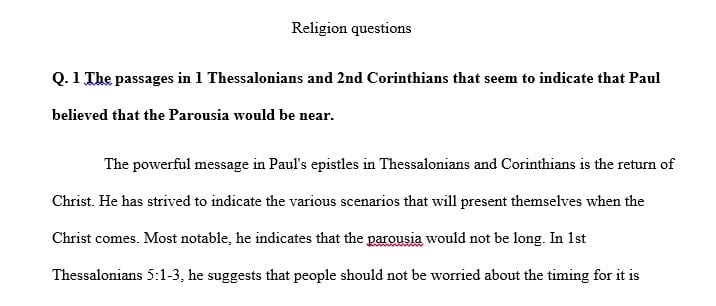Which passages in I Thessalonians and I Corinthians seem to indicate that Paul believed the parousia to be near
1. Which passages in I Thessalonians and I Corinthians seem to indicate that Paul believed the parousia to be near?
2. When Paul advises believers about choosing between marriage and the single life, how much do you think his expectations that the parousia might be near affected his advice? Explain why/why not.
3. How does Paul compare divine wisdom to human reason in the first 3 chapters of I Corinthians?
4. How does Paul link Jesus’ resurrection to the Christian hope of an afterlife?
5. In 2 Corinthians chapters 10-13, what arguments do Paul’s opponents at the church in Corinth use against him? How does Paul use his mystical experiences to counter these arguments?
6. As Paul describes it in Romans 1-3, how is all humanity trapped in a hopeless predicament? How has God acted to rescue people from the power of sin and death?
7. Define what Paul means by righteousness, justification and faith. Why does Paul tell the Galatians especially (although he says the same thing in Romans) that circumcision is no longer necessary?
8. What have scholars recently concluded about the traditional view of Paul’s interpretation of Judaism? In particular, what are they saying about Judaism’s supposed legalism and about the role of faith in Judaism?
9. In Romans ch. 1 Paul speaks of humanity’s guilt and of its turning away from God in favor of mere idols. What is humanity’s responsibility in this? What are the consequences of this idolatry?
10. Paul speaks of Jesus as a kind of “second Adam”. What does he mean by this? Specifically, what does Jesus do differently from Adam that leads to our salvation? What did Adam do that lead to our deaths?
11. Why is it difficult to know exactly where Paul was imprisoned when he wrote to Philemon and the church at Philippi?
12. What issue does Paul have to address in Philippians 3 that he already was forced to address in his letter to the Galatians? What is Paul’s mood during this part of his letter and what language does he use to indicate how he feels?
13. What do we suspect that Onesimus did to get him in to trouble and why do we think that he finally ended up with Paul?
14. What does Paul tell Philemon to do upon Onesimus’ return? Why does he give this advice?
Answer preview to which passages in I Thessalonians and I Corinthians seem to indicate that Paul believed the parousia to be near
APA
1442 words



